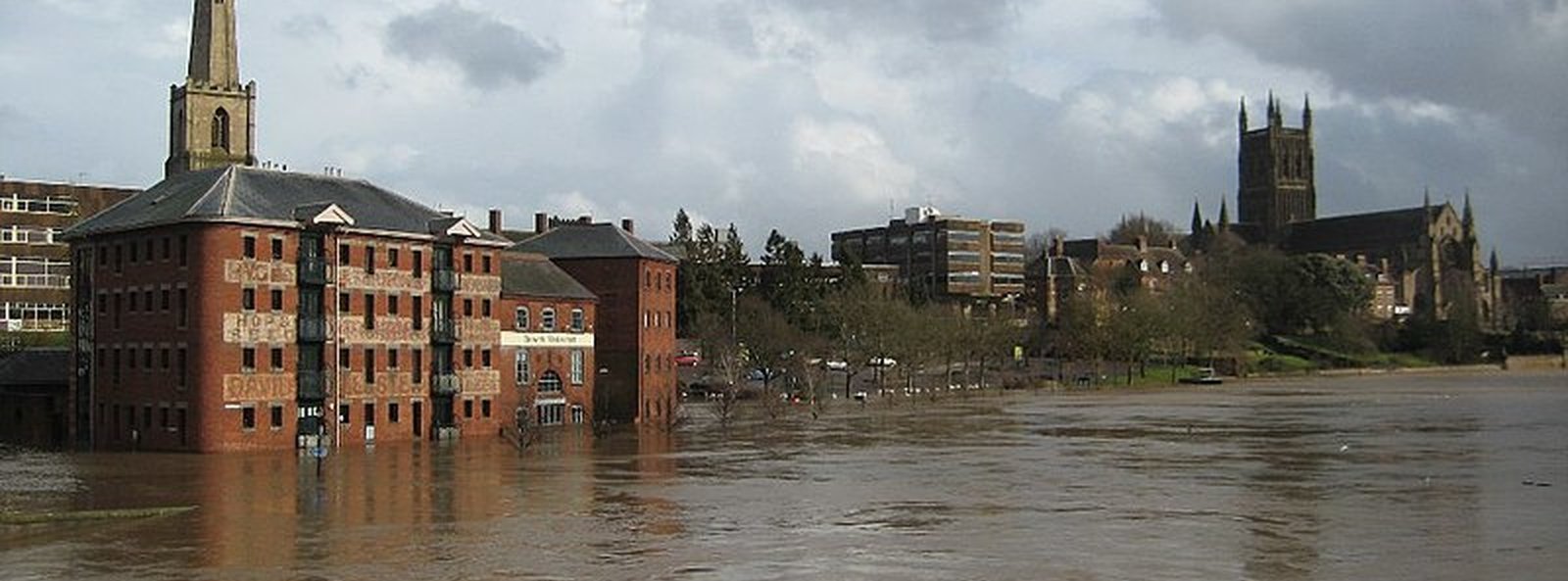Storm Henk, known for its continuous heavy rainfall, has caused water levels to rise quickly resulting in severe flooding in several areas of Gloucestershire and Worcestershire.
This natural disaster has created multiple challenges for both residents and businesses alike. Coping with water ingress and related damages has become a daunting task for many. Some have lost their homes and possessions, while others are still struggling to find a way to deal with the aftermath of the storm. The immediate focus is on providing relief efforts to those affected by the floods and supporting them in rebuilding their lives.
Floods can cause significant damage to your property, leading to both physical and financial burdens. In this blog, we will provide you with valuable information on understanding the impact of floods, immediate steps to take after a flood, navigating insurance claims, prevention measures for future floods, and when to seek professional help.
Understanding the Impact of Floods on Property
Floods have the potential to wreak havoc on your property, causing extensive damage and posing various risks. As property owners, it is crucial to be aware of the impact that floods can have on your property. Not only can flood water cause severe damage to your premises, but it can also lead to further damage if not addressed promptly. Additionally, mildew and sewage may contaminate your property, requiring thorough precautions. It's important to understand that flood damage can also have financial consequences, potentially impacting the value of your property and requiring costly repairs.
The Physical Damage
When your property is affected by flooding, there are several aspects of physical damage that you need to consider. Flood water can infiltrate your premises, causing water damage to your belongings, appliances, and electrical systems. It is important to assess the extent of water damage and take necessary precautions to prevent further damage. This may involve checking your fuse box, electrical systems, and appliances for any signs of flooding or water damage. Repair works are essential to restore your property to a habitable condition, and seeking professional advice can ensure that your property is flood-resilient.
Mildew and sewage are also common issues after a flood, posing health risks and further damage to your property. It is crucial to take precautions and follow appropriate safety measures when dealing with mildew and sewage. Thoroughly cleaning and sanitising your premises, belongings, and appliances are essential to ensure your property is free from any potential contaminants.
The Financial Burden
Flood damage can bring about a significant financial burden for property owners. The cost of repairs can escalate rapidly, especially if the damage is extensive. In addition to repair costs, insurance claims may need to be filed to cover the expenses incurred due to flood damage. However, it's important to note that insurance coverage may vary, and not all policies cover flood damage. It is crucial to review your insurance policy and understand your coverage before a flood occurs.
Furthermore, flood damage can affect the value of your property, potentially making it more challenging to sell or rent in the future. It is essential to document and assess the damage thoroughly to support your insurance claim and protect the value of your property. Seeking guidance from insurance claim adjusters, as well as local council and citizens advice, can provide support and advice for flood victims dealing with the financial implications of flood damage.
Immediate Steps to Take After a Flood
When faced with flood damage, taking immediate action is crucial to minimize further damage and ensure the safety of yourself and your family. Your safety should always be the top priority. If necessary, evacuate your premises, ensuring you have alternative accommodation to stay in temporarily. Precautions should be taken to prevent electric shocks and other potential hazards post-flooding.
It is advisable to contact your local council and insurance provider immediately to report the flooding incident. Alerting your landlord or tenants, if applicable, can also help with timely action and assistance. Seeking advice from legal or insurance professionals can further aid in understanding your rights, responsibilities, and available options. It is also important to inquire about available flood warning systems to better prepare for future flood events.
Prioritise Safety
After a flood, ensuring the safety of your premises is of utmost importance. Before reentering your property, make sure it is safe to do so. Take necessary safety precautions, such as turning off your fuse box and electricity supply, if it is safe to access these areas. If you are unsure of the safety measures to take, seek advice from local citizens advice, an electrician, or other relevant professionals who can guide you on your legal responsibility as a property owner.
Notify Relevant Authorities
In case of flood damage, it is essential to notify the relevant authorities promptly. This will help in starting the necessary processes to address the damage and mitigate further risks. Here are some key actions to consider:
- Contact your insurance provider to report the flooding incident and initiate the claims process.
- Notify your local council or relevant authorities about the flood damage, ensuring that they are aware of the situation and can provide assistance where necessary.
- Take steps to minimize further damage, such as implementing temporary repairs if possible, while waiting for professional assistance.
- Keep detailed records of the damage, including photographs, damage assessments, and any expenses incurred.
- Collaborate with your insurer to mitigate further damage, expedite repairs, and ensure necessary steps are taken to prevent future flooding events.
Dealing with Water Damage
Water damage is a common consequence of flooding, and dealing with it effectively is crucial to prevent further damage and ensure the resilience of your property. Assessing the extent of water damage and understanding the impact on your property is essential for initiating the cleanup process. By evaluating the damage, you can determine the necessary steps to restore your property and minimize the risk of future damage.
Assessing the Extent of Damage
Assessing the extent of water damage is a crucial step in the flood damage recovery process. It entails gathering detailed information about the areas affected by flooding, the severity of the damage, and the resilience of your property. Taking the time to assess the damage thoroughly enables you to develop a comprehensive action plan and ensures that no hidden damage goes unnoticed. Seeking professional assessments and advice can provide essential insights into the extent of damage and guide your decision-making process for repairs and restoration.
Initiating the Cleanup Process
After assessing the water damage, it is important to initiate the cleanup process promptly. Here are some essential steps to consider:
- Remove standing water and dry the affected areas using dehumidifiers and fans.
- Ensure the thorough cleaning and sanitisation of your premises, belongings, and appliances to prevent the growth of mildew and the spread of bacteria.
- Dispose of any contaminated materials, such as sewage-damaged items, following local regulations.
- Inspect your electrical systems and appliances for damage, ensuring they are safe to use before restoring power.
- Consider temporarily relocating to alternative accommodation, especially if your home is extensively flooded or unsafe to inhabit.
Navigating Insurance Claims for Flood Damage
When dealing with flood damage, navigating insurance claims can be a complex process. Understanding how insurance plays a role in flood damage and knowing how to file a claim successfully can help ease the financial burden of repairs and restorations. In this section, we will discuss the importance of insurance coverage, the role of adjusters, and the steps you can take to file a claim successfully.
The Role of Insurance in Flood Damage
Insurance coverage can significantly alleviate the financial burden of flood damage. As property owners, having adequate insurance coverage that includes flood damage is crucial. It provides financial protection against the cost of repairs, alternative accommodation, and potential losses due to damage. Some important points to consider regarding insurance coverage for flood damage include:
- Review your insurance policy to understand the extent of coverage for flood damage.
- Explore options for property flood resilience action plans, which may improve your insurer's perception of your property's flood resilience.
- Understand your insurer's requirements and responsibilities in the event of flood damage.
- Keep detailed records, including photographs, damage assessments, and receipts, to support your insurance claim.
How to File a Claim Successfully
Filing a flood damage claim successfully requires careful preparation and attention to detail. Here are some key steps to follow when filing an insurance claim for flood damage:
- Contact your insurance provider promptly to report the flood damage and initiate the claim process.
- Provide the adjuster with detailed information, including photographs, damage assessments, and any relevant receipts.
- Familiarize yourself with your legal responsibilities as a property owner during the filing process.
- Seek advice from professionals, such as legal or insurance experts, to ensure a smooth claim process.
- Keep a record of all communication and documentation related to your claim.
In the event of a flood, it is important to reach out to your insurance provider and adhere to their guidance. If you do not have insurance coverage, you can seek assistance and support from the National Flood Forum: 01299 403055.
When to Seek Professional Help
While there are certain steps property owners can take after flood damage, some situations may require professional assistance. It's important to know when to seek help from flood damage restoration services. In the next section, we will discuss signs that flood damage may be beyond your capabilities, the benefits of hiring professionals, insurance considerations, and the potential dangers associated with flood damage.
Identifying Reliable Flood Damage Restoration Services
When faced with extensive flood damage, it becomes crucial to seek professional assistance from reliable flood damage restoration services. Here are some factors to consider when identifying reputable restoration companies:
- Look for licensed and insured flood damage restoration services that specialise in dealing with flood-related issues.
- Read online reviews and testimonials from previous customers to gauge the reputation and reliability of the company.
- Request a detailed estimate, ensuring that the company provides a guarantee or warranty on their work.
- Choose a restoration company that offers ongoing communication and transparency throughout the restoration process.
Is it Possible to Fully Recover from Flood Damage?
Recovering from flood damage can be a challenging process, but it is possible to fully restore your property with the right support and resources. While the immediate impact of flood damage can be overwhelming, comprehensive restoration efforts and flood resilience measures can contribute to your property's full recovery. By implementing flood resilience strategies, collaborating with flood resilience experts, and seeking assistance from professional restoration services, property owners can navigate the recovery process and restore their premises to a habitable and resilient state.
Useful Links
National Flood Forum: A charity to help, support and represent people at risk of flooding
GOV.UK
Blue Pages: A directory of property flood products and services put together to advise of what’s available to help reduce the risk of flooding.
Prevention Measures for Future Floods
While it may not be possible to prevent floods entirely, there are proactive measures you can take to minimize the risk of future flood damage to your property. Implementing prevention measures can significantly enhance your property's flood resilience and protect your premises, belongings, and appliances from potential damage. In this section, we will discuss flood-proof home designs and the value of early warning systems in preventing flood damage.
Implementing Flood-Proof Home Designs
Implementing flood-proof home designs can go a long way in reducing the impact of flood damage on your property. Here are some flood-proof home design strategies to consider:
- Elevating your property above flood level through foundation modifications or raised platforms.
- Installing flood-resistant materials, such as water-resistant flooring or wall coverings, to mitigate water damage.
- Incorporating flood defences, such as flood gates, flood-resistant doors, or resilient landscaping, to minimize water ingress.
- Ensuring that electrical systems, appliances, and other critical utilities are located above flood-risk areas.
- Collaborating with flood resilience experts during the design process for tailored solutions to your property.
Importance of Early Warning Systems
Early warning systems play a vital role in mitigating flood damage by providing timely alerts and information. Here's why early warning systems are crucial for property owners:
- Early warning systems can provide advance notice of flood events, allowing property owners to take necessary precautions.
- Accessing flood warning information can help property owners make informed decisions and implement flood resilience measures.
- Being aware of flood risk in your area can prompt property owners to develop action plans and engage with local authorities or flood resilience organisations.
- Early warning systems enable property owners to plan for temporary accommodation or alternative arrangements promptly.
- Collaborating with local authorities and staying updated on early warning systems can significantly enhance your property's flood resilience.
Conclusion
In conclusion, managing flood damage requires prompt action and careful consideration of your property's safety and financial implications. The immediate steps after a flood include prioritising safety and notifying relevant authorities. Dealing with water damage involves assessing the extent of damage and initiating the cleanup process. Navigating insurance claims for flood damage requires understanding the role of insurance and filing a claim successfully.
Prevention measures for future floods include implementing flood-proof home designs and early warning systems. In some cases, seeking professional help from reliable flood damage restoration services may be necessary. While recovering fully from flood damage may be challenging, taking proactive measures can help minimise the impact and protect your property in the long run.





